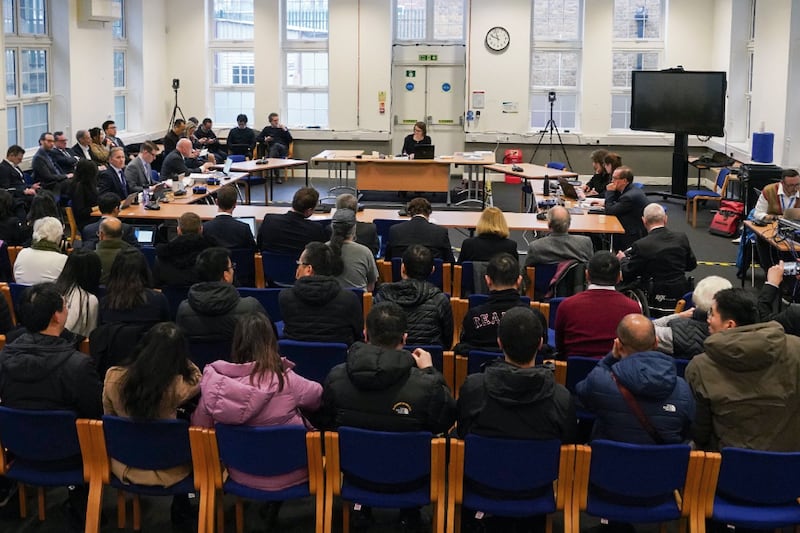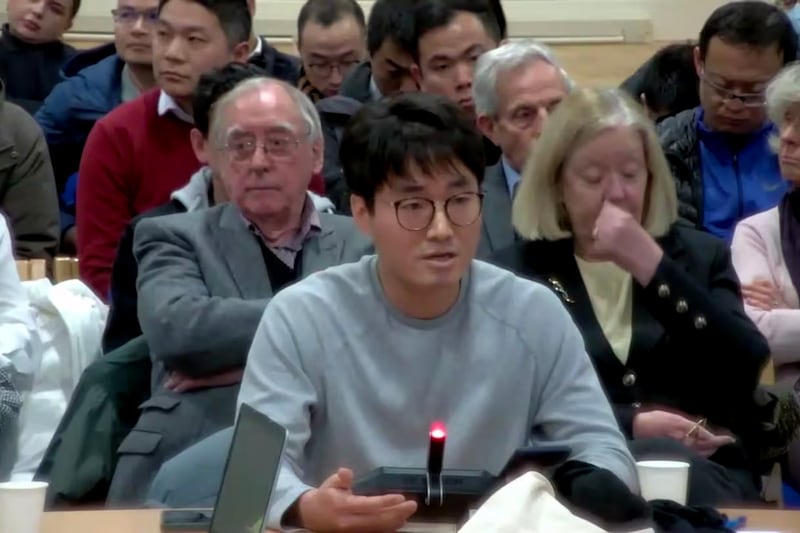Days after thousands of people rallied in London to protest plans for a new Chinese “super-embassy,” the local council has said it won’t argue against the project at a key government hearing, sparking allegations of political pressure from the highest levels of government.
The Chinese government purchased the historic Royal Mint in 2018 -- near the Tower of London -- with plans to build what would become Beijing’s largest diplomatic facility globally. Rights groups and protesters warned that the facility would facilitate espionage and Beijing’s "long-arm" law enforcement.
On the first day of a 12-day planning inquiry, Morag Ellis KC, a lawyer acting on behalf of Tower Hamlets Borough Council, said the council wouldn’t be offering any evidence opposing the plan, despite having previously rejected the Chinese government’s planning application on two occasions.
She said the main reason was the withdrawal by the city’s Metropolitan Police of its objections to the project.
“In the light of the Metropolitan Police services' changed position and the external transport advice, which mirrored that of the statutory highway authorities, it would have been irresponsible to seek to pursue the putative reason for refusal,” Ellis told the hearing on Tuesday.
The hearing was packed with observers in the public gallery, with groups of people speaking Mandarin lining up early to get a seat. At least a dozen would-be observers were turned away after the venue reached capacity.

Ellis also cited advice by transportation consultants iTransport, and that of government highway authorities.
“On the 12th of January this year, the Borough issued its revised statement of case, explaining why it was no longer in a position to present evidence in support of the putative reason for refusal,” Ellis said.
Safety and security concerns
China resubmitted its application to build the massive new facility in London despite being rejected in 2022 amid a vocal campaign by rights groups.
The Metropolitan Police had earlier spoken against the planned embassy due to safety and security concerns, particularly relating to expected large-scale protests outside the facility, which includes plans for offices, residential quarters and cultural venues.
“The Metropolitan Police Service’s Public Order Command are content that, on balance, there is sufficient space for future protests to be accommodated without significantly impacting the adjacent road network,” the force said in a Jan. 17 letter confirming its change of position, which it said was based on a three-year-old council document.
The U-turn sparked allegations that the plan is being pushed through by strong political pressure from the highest levels of government.
Simon Bell, a lawyer speaking on behalf of the neighboring Royal Mint Court Residents Association, which opposes the plan, said it was “clear that there has been a political pre-determination of these applications at some of the highest levels of central government.”
He said a three-year-old assessment by the council couldn’t predict the size of future demonstrations, and cited the Met Police’s failure to contain Saturday’s protest at the proposed site.
“Roads were blocked and considerable police presence confirmed the residents’ fear for their safety and security,” Bell told the hearing. ”If this is a taste of what is to come in respect of a proposed embassy, one can only imagine how the adverse effect of protests will impact on the residents’ safety and security, during any construction period, let alone after the embassy has come forward.”
RELATED STORIES
Thousands rally against China’s ‘mega-embassy’ in London
London council rejects China’s ‘super-embassy’ plan - again
Activists vow to fight China’s bid for new ‘super embassy’ in London
Luke de Pulford, executive director of the cross-party Inter-Parliamentary Alliance on China, said the police appeared to have been “influenced by forces other than the merits of the application.”
“The public understanding is that the police are operationally independent and that their decisions regarding public safety ought to brook no interference,” he said.
Infiltration and attacks
The planning application comes amid growing concerns over Chinese Communist Party infiltration of all aspects of British life, and warnings from Hong Kongers in exile over growing acts of violence by Beijing supporters and officials alike.
Overseas activists frequently report being targeted by agents and supporters of the Chinese state, including secret Chinese police stations in a number of countries.
Simon Cheng, co-founder of the advocacy group Hongkongers in Britain, said the proposed embassy posed a “serious risk to public safety, local infrastructures, and fundamental democratic freedoms,” and warned that it would become a “flashpoint of large-scale protests against Chinese Communist Party human rights abuses.”
“This embassy will ... be an extension of Chinese Communist Party’s authoritarian reach into Britain,” Cheng said. “We have already seen the evidence of Chinese diplomatic outposts being used for, for example, monitoring and intimidating exile activists like Hong Kongers, Tibetans, Chinese dissidents in the UK [and] Uyghurs.”

“This embassy will make it even easier for Chinese authorities to track, intimidate, and suppress critics of such a regime.”
Cheng said the embassy could also empower efforts to suppress free speech on British soil.
“The Chinese government has a history of pressuring businesses, universities, and local institutions to align with its interests,” he said. “It is about whether Britain is willing to host and legitimise an embassy that will serve as a hub for authoritarian influence.”
Translated by Luisetta Mudie.
